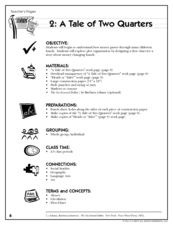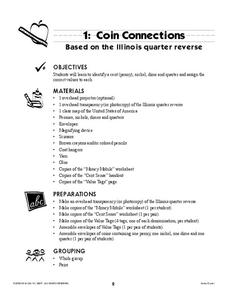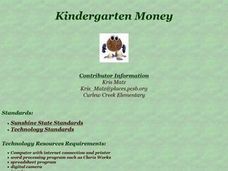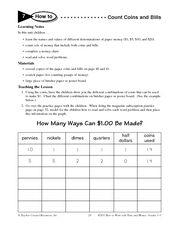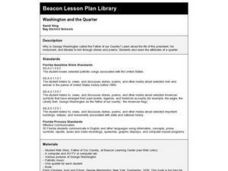Curated OER
Design a Coin
Students research a state and then design a quarter for it. They use dough or foil to create the coin! students explore state quarters that have already been issued by the U.S. Mint. Their quarter is for a state that hasn't had one...
Curated OER
The Coin and the Fable: Alaska quarter reverse
An Alaskan quarter and a book of fables is what you'll need to start this lesson. Learners will use the image of the bear and the salmon found on the reverse side of the Alaskan quarter as inspiration. They will compose a fable about the...
Curated OER
A Tale of Two Quarters
Have your class use the life of a quarter to understand and design plot and flow charts. They read the book, The Go-Around Dollar, think about how their teacher got her quarters that day, then create a flow chart. They have to show how...
Curated OER
What can money tell us?
High schoolers study the physical presence, imagery and written text on a reproduction of colonial currency. They apply their research to a modern day quarter to compare and contrast two coins. In addition, they design their own colonial...
Curated OER
Show Me The Money
Third graders explore the value of U.S. money. For this money lesson, 3rd graders print out pictures of money from the Internet and create play money. The students will play a game in which they display the amount of money called out by...
Curated OER
What is Currency?
Students study the history of currency and the monetary system of historic Akan people, who lived on the Atlantic coast of Africa. This outstanding series of lessons is multi-disciplinary and contains many activities for different...
Curated OER
Coin Connections
A wonderful lesson on identifying the penny, nickel, dime, and quarter awaits your young mathematicians. They engage in a multi-session lesson which allows them to practice using the values of each coin in worksheets and activities...
Curated OER
Musical Change
Young learners record observations about different coin denominations and create a song about coins to the traditional song, "The Wheels on the Bus." This lesson is based on the Tennessee Quarter Reverse, and has all sorts of excellent...
Curated OER
Kindergarten Money
Students identify the various coins and their values through presentations, a rubric, a value pretest, and coin manipulatives. Money is incorporated into various activities whether at home or in school. Students create money webs using...
Curated OER
A World of Money
Students explore the traditions related to the creation of national currencies. The role currency plays in shaping a national or regional identity and the influences that the designers of world currency exert are examined in this lesson.
Curated OER
How To: Count Coins and Bills
Students discover the names and values of different monetary denominations. In this money instructional activity, students examine the different combinations that money can be added in to find specified amounts. The students complete...
Curated OER
My Money
Young scholars identify and interpret the relationships between various components of currency, discusses the uses of money, and provides advanced lessons on making change. They also identify the various ways that money is used and how...
Curated OER
Quarters from the Coast
Students discuss Fifty State Quarters Program, compare and contrast location of land and water on map of United States, while also becoming aware of physical shape of nation and home state, and explore coastal areas in United States.
Curated OER
Washington and the Quarter
Young scholars study the life of George Washington, his monument, and tributes to him through stories and poems. They study the attributes of a quarter.
Curated OER
Money
Students study the value of the penny, nickel, dime, quarter and dollar. They demonstrate how different coin combinations equal the same amounts of money and write money amounts using the decimal point and dollar sign. They try to...
Curated OER
Managing My Money
Second graders use The Berenstain Bears' to learn about money management. For this money management lesson, 2nd graders read The Berenstain Bears' Dollars and Sense book and complete the 'Rainy Day' worksheet. Students then discuss the...
Curated OER
It's Time to Rhyme
Students listen to rhyming book, identify rhyming pairs, guess what rhyme words mean, and create list of rhyming pairs on chart paper. They then discuss Fifty States Quarters Program, identify objects on backs of state coins, and...
Curated OER
Money and Business (Art)
Third graders investigate world currency by creating their own coin art. In this government lesson, 3rd graders examine the characteristics of different coins and create their own design for a new one. Students discuss and...
Federal Reserve Bank
Something Special For Me
People often save money, but what are the benefits and drawbacks of that action? Youngsters learn about saving, savings, and opportunity cost through the lens of a short book, called Something Special for Me.
Curated OER
Introducing money (Elementary, Mathematics)
Students study the penny, nickel, dime and quarter, one each day for four days, using a magnifying glass to identify the similarities. Then students discuss differences and value and learn a 'rap' to memorize values.
Curated OER
Math -- Money
Young scholars identify a penny, nickel, dime, quarter and a half dollar. They examine the value of each coin and its equivalents (to quarter/dollar). After pairing up with a classmate, each one drills the other one on each coin.
Curated OER
Trading Traditions: Based on the American Samoa Quarter Reverse
Young scholars investigate U.S. Currency by researching American Samoa. In this monetary unit lesson plan, students define the reverse and obverse of a coin while completing a currency related worksheet. Young scholars...
Curated OER
Credit as Currency: Ancient World History
Students examine use and principles of currency as it relates to the establishment and continuation of credit and banking systems.
Curated OER
Money Talks Canadian Money
Students use newspapers, games and journal writing activities to examine the importance of money and the role it plays in daily life. They complete several math problems, fill out worksheets and practice changing varying amounts.


